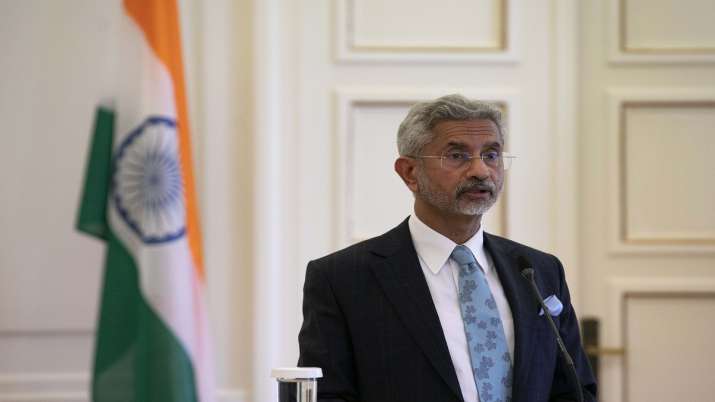
Code of Conduct on South China Sea should be in line with UN Convention: External Affairs Minister S Jaishankar.
India on Wednesday asserted that the Code of Conduct on the South China Sea should be fully in line with the relevant United Nations Convention and negotiated should not prejudicially affect the legitimate rights and interests of countries not involved in the discussions.
In a virtual address at a meeting of the East Asia Summit (EAS), External Affairs Minister S Jaishankar also highlighted the growing convergence of perspectives on the Indo-Pacific region among various members of the grouping.
Separately, Jaishankar also addressed a meeting of ASEAN-India foreign ministers, during which he touched on a range of issues, including connectivity, and said India looked forward to an early review of the “Trade in Goods Agreement”.
Jaishankar tweeted about his meeting with the foreign ministers of EAS member states, “emphasised that the Code of Conduct on the South China Sea should be fully UNCLOS 1982 compliant. Prejudicial to the legitimate rights and interests of those countries.” should not influence those who are not included in the discussion.”
China claims sovereignty over the entire South China Sea, which is a major source of hydrocarbons. However, there are counterarguments from several ASEAN member states, including Vietnam, the Philippines and Brunei.
India has been advocating a rules-based order in the region, which includes adherence to international law, particularly UNCLOS (United Nations Convention on the Law of the Sea).
In his address at the EAS meeting, Jaishankar also supported the “ASEAN five-point” consensus on Myanmar and welcomed the appointment of a special envoy.
The External Affairs Minister also spoke about the growing COVID-19 challenge facing ASEAN and conveyed India’s support and solidarity.
Jaishankar described the discussions at the ASEAN meeting as “original and useful”.
He said, “The broader context in which we look at our relations today, because something really important is indisputably the COVID-19 crisis. We have seen how ASEAN members, both individually and collectively, have It has been answered objectively.”
“These challenges have brought ASEAN and India even closer, as we have given each other practical support in this time of tension. We can discuss this later,” Jaishankar said.
He said that ASEAN is considered a good example of successful regionalism, multilateralism and globalization across the world.
Jaishankar said, “This year’s theme of ‘We Care, We Prepare, We Prosper’ under the able chairmanship of Brunei summarizes ASEAN’s vision. I am sure this theme applies equally to our partnership as well. Is.”
He said that the fact that ASEAN-led initiatives have established their importance in many areas speaks for itself.
“India remains committed to supporting a strong, integrated and prosperous ASEAN, whose centrality in the Indo-Pacific is fully appreciated,” he said.
“The strong convergence between the ASEAN Outlook on the Indo-Pacific (AOIP) and the Indo-Pacific Ocean Initiative (IPOI) proposed by India adds another dimension to our contemporary partnership,” Jaishankar said.
He said India’s relations with ASEAN are rooted in history and have been closely strengthened.
“Together, these are factors that can help us achieve a more ‘connected’ India and ASEAN vision. This will naturally require the realization of a dedicated set of initiatives, which of course will help us achieve our goals.” Collaborative is the core of the agenda.” Foreign Minister said.
In a series of tweets, he said that most of India’s interests and relations now lie in its east, which is a testimony to its ties with ASEAN (Association of Southeast Asian Nations).
EAM also stressed on expediting connectivity projects and especially talked about the Trilateral Highway and Kaladan projects.
The ambitious India-Myanmar-Thailand Trilateral Highway is expected to boost connectivity between the three countries.
The Kaladan Multi-Modal Transit Transport Project is being seen as India’s gateway to Southeast Asia.
On the coronavirus pandemic, he said India and ASEAN are “strong partners in the Covid response: medicines or oxygen, equipment or logistics”.
Jaishankar also proposed 2022 as the ASEAN-India Friendship Year to mark the 30th anniversary of the ties between the two sides.
ASEAN is considered one of the most influential groups in the region, and India and several other countries including the US, China, Japan and Australia are its dialogue partners.
Relations between India and ASEAN have grown exponentially over the years, with a focus on increasing cooperation in the areas of security and defence, along with trade and investment.
The EAS is the premier forum in the Asia-Pacific region to deal with issues related to security and defence. Since its inception in 2005, it has played an important role in the strategic, geopolitical and economic development of East Asia.
In addition to the 10 ASEAN member states, the EAS includes India, China, Japan, Republic of Korea, Australia, New Zealand, the United States and Russia.
.